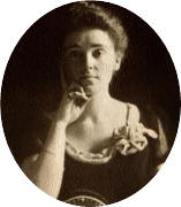Mary (Molly) Alden Osgood Childers (1875 - 1964)
American-born Irish Nationalist, Writer, Howth Gunrunning Participant, Humanitarian
 Mary
(Molly) Alden Osgood Childers was born on
December 14, 1875 to
Dr Hamilton Osgood and his wife
Margaret Cushing Osgood
in Beacon Hill, Boston,
Massachusetts. Molly’s mother
Margaret was a renowned anthologist, author and
poet.
Mary
(Molly) Alden Osgood Childers was born on
December 14, 1875 to
Dr Hamilton Osgood and his wife
Margaret Cushing Osgood
in Beacon Hill, Boston,
Massachusetts. Molly’s mother
Margaret was a renowned anthologist, author and
poet.
The Osgood family lineage goes back to the early English pilgrim who settled in the New England colonies in the 1620’s and 1630’s. In all, the names of three Osgood families were included in the manifests of at least two passenger ships that arrived in the New England colonies during that period.
Which of these three families the Beacon Hill Osgood's' hailed from is unknown. Irrespective, the Osgood's, as a whole were patriots who, believed in liberty and fought with the colonists in the Revolutionary War to break free from England’s dictatorial rule and establish an independent Republic.
The Osgood's lineage also includes John Quincy Adams, the sixth President of the United States. Molly was proud of that connection and admired Adams for his belief in and commitment to America’s republican form of government..
From an early age Molly was physically disabled as a result of a skating accident. Unable to walk she was confined to her home where she was privately tutored. Her mother was the most important and influential person in her early life who helped her deal with her debilitating situation, encouraged her to read and pursue a career in academia that would accommodate her disability and allow her to function effectively as a contributing member of society
At age thirteen Molly underwent an operation that allowed her to walk with crutches that gave her a degree of independence and functionality. One of her favorite occupations was spending time in the nearby library poring over rare volumes entrusted to her by the library staff despite her age. Not to be outdone by her peers she participated in as many activities as her disability would allow, including conducting a junior orchestra.
Due the family's prominence, they entertained many of Boston's elite in their home. One visitors who was a frequent guest of the Osgood's was John Boyle O'Reilly the Fenian who, in 1866 was sentenced to death by the British; a sentence later commuted to 20 years penal servitude. He escaped from a British Penal Colony in Australia in the early 1869 and arrived in the United States in November, some nine months later. O'Reilly was a publisher, writer and poet, desirable company for Boston's cultural elite.
Molly first met Erskine Childers, he husband to be, in 1903 while he was visiting Boston with the Honorable Artillery Company of London. Before returning to England Erskine proposed to her. They were married in Boston in January of 1904 and shortly thereafter left for England where they resided until 1919.
While living in England Erskine worked in the House of Commons. They had three children, one of whom died shortly after birth. Their oldest, Erskine Hamilton Childers, served as the fourth president of the 26-county Irish State from 1973 until his death in 1974.
Erskine had close ties to Ireland. When, at the age of 12, his Irish mother, a product of the Protestant Ascendancy, died he and his siblings went to live with her family in Annamoe in Co. Wicklow.
Childers was somewhat of an enigma in that his staunch belief in the British Empire was inconsistent with his advocacy for home rule for Ireland. That dichotomy was clearly manifested in 1914 when Childers and other conspirators negotiated the purchase and shipment of 1,500 rifles and 49,000 rounds of ammunition from arms firm Moritz Magnus in Hamburg to arm the Irish Volunteers to counter a threat posed by Ulster Volunteers who opposed home rule.
Molly was very much involved in the what became known as the Howth gun running from the onset. In May of 1914 a committee of Anglo-Irish nationalists was set up to raise funds to procure the arms. Alice Stopford Green was the treasurer and Molly was the secretary . Roger Casement and Darrell Figgis were responsible for contacting arms suppliers and arranging for the purchase of the guns and ammunition. Childers paid for the arms and arranged for the handover.
On 12 July 1914 the arms were transferred from a German tugboat to Childers's yacht, the Asgard, and to the Kelpie owned and operated by Edward Conor Marshall O'Brien a distinguished intellectual, Irish Republican and grandson of Fenian William Smith O'Brien.
The Asgard sailed into Howth harbor on July 29 with Molly at the helm. The arms were handed over to the awaiting Irish Volunteers.
The Kelpie' captain, in order to avoid capture by the alerted British Navy, transferred its cargo to the Chotah owned by Sir Thomas Myles, a home rule advocate and surgeon. The Chotah unloaded its cargo at Kilcoole in Co. Wicklow under cover of darkness on August. 1st.
The smuggled cache of arms and ammunition was used by the Republican Volunteers in the Easter Rising of 1916.
What seems like an obvious contradiction to his gun running activities on behalf of the Irish Volunteers, Erskine enlisted in the British Naval Air Service at the onset of World War II where he served until March 1919. During that period Molly was honorary secretary of a committee set up to look after the welfare of Belgian refugees.
Shortly after the Irish War of Independence started Erskine moved to Ireland. He became involved with Sinn Fein and was appointed Director of Publicity for the First Dail Eireann. He was the architect of the Republican movements successful propaganda campaign.
Molly who had stayed behind in London joined Erskine in Ireland toward the end of 1919. After settling in Ireland Molly's became active in the fight for Irish Independence as a writer and fill in publisher of the Irish Bulletin, the official gazette of the government of the Irish Republic. She also catered to foreign journalists and worked closely with Minister for Finance Michael Collins managing and distributing monies raised by the Dail Eireann Loan that amounted to approximately ₤350,000.
From 1921 Molly was a trustee of the Irish White Cross, an organization established in 1921 to distribute funds raised by the American Committee for Relief in Ireland.
In 1921 Erskine was a secretary on the Dail Eireann delegation sent to London by de Valera to negotiate a treaty to end Ireland's War of Independence with England. The terms agreed by Michael Collins and the other delegates were ratified by the members elected to sit in the House of Commons of Southern Ireland and the British Parliament as required by terms of the Treaty. Although the Irish delegation was appointed and sent to London by Dail Eireann the treaty was ratified by a British constituted Irish Home Rule parliament. Childers opposed the treaty as did Molly who believed it was signed under duress.
The ratification of the treaty resulted in what was in fact was a second phase of the War of Independence. Although it is generally referred to as the Irish Civil War, the reality is that pro-treaty forces were wholly armed by the British and the bulk of its army was made up of de-mobbed Irish-born British army veterans of WWI.
The Childers sided with the anti-treaty forces of the Irish Republican Army in the ensuing war. Winston Churchill, the British Secretary of State for the Colonies and the primary impetus behind the Free State's push to crush resistance to the treaty, was incensed by Erskine's opposition to it. In an attempt to denigrate Erskine's character and motives Churchill issued the following pronouncement: "No man has done more harm or shown more genuine malice or endeavored to bring a greater curse upon the common people of Ireland than this strange being, actuated by a deadly and malignant hatred for the land of his birth".
Fearing a repeat of Erskine's successful War of Independence propaganda campaign coupled with Churchill's vilification, Erskine became one of the Free State's primary targets for assassination. Knowing this Molly counseled Erskine to leave the country to avoid capture and certain death. Her concern for his life was heightened after Michael Collins was killed and the Free State became more brutal and fascist in its conduct and treatment of prisoners.
In November of 1922 Erskine was captured and two weeks later summarily executed; the first of 77 men to face the same fate.
After Erskine's
execution Molly released the following statement
to the press; "His sacrifice is as much a
gift to me as it his comrades who serve
Ireland's cause".
Molly remained
committed to the Republican cause for which her
husband gave his life. In 1926 she was honorary
treasurer of the Republican Daily Press
Fund established in 1924 to raise funds
for a republican newspaper. The resultant
Irish Press was published in 1931.
For the remainder of her life she was beset by health problems exacerbated by her lifelong disability. She was a patient in the Brookline Hospital in Massachusetts from 1947 to 1950. After her hospitalization ended she returned to live in Glendalough House in Annamoe Co Wicklow where she spent her remainder of her life until her death on January 1, 1964.
Contributed by; Tomás Ó Coısdealbha
cemetery AND grave location
Name: Glasnevin Cemetery
ADDRESS: Finglas Road, Glasnevin, Dublin 11, Ireland
LOCATION: Republican Plot.

